Zinger Key Points
- Five stocks that could benefit from US tariffs on foreign imports are analyzed.
- With stocks plunging, steady income is key. Tim Melvin & Ryan Faloona reveal dividend stocks and deep-value plays on April 8. Reserve your spot now.
Predicting the actions of an incoming administration is always tricky, and that's doubly true for someone with a penchant for saber rattling like Donald Trump. While Trump seems committed to another round of tariffs (especially aimed at Chinese imports), the actual size and scope of these moves remains to be seen.
Many business leaders and executives are preparing for new tariffs by readying consumers for increased costs, and the retail sector could be hit hard if the most protective policies come to fruition.
However, not every company stands to suffer from tariff expansion. Some industries, like domestic shippers and specialty retailers, saw a boost in the wake of the election results.
Here are five stocks that stand to benefit from American tariffs on foreign imports.
Methodology
To find stocks that will benefit from tariffs, we need to look for firms with reliable production alternatives outside China and the ability to pass on extra costs to consumers.
If a company’s main competitors have high import costs or lack that kind of pricing power, even better.
Let’s go through the list:
AutoZone Inc. AZO
DIY auto store stocks have soared in the post-pandemic era, and the two clear winners have been AutoZone and Oreilly Automotive Inc. ORLY. Both companies have had little issue raising prices during previous tariff implementations, and investors have no reason to assume they won't do the same in the face of the next round.
AutoZone is uniquely positioned to benefit from a higher tariff environment. Even when the first round of tariffs was administered during Trump's initial term, AutoZone still managed to improve its profit margins despite higher costs. Additionally, DIY auto parts stores often hold significant pricing power over consumers since fixing a car is usually a non-negotiable part of life in America (especially in the suburbs). CEO Philip Daniele recently stated that the company intends to pass any tariff increases back onto consumers, which could prompt a flurry of car repair activity before the calendar flips to 2025.
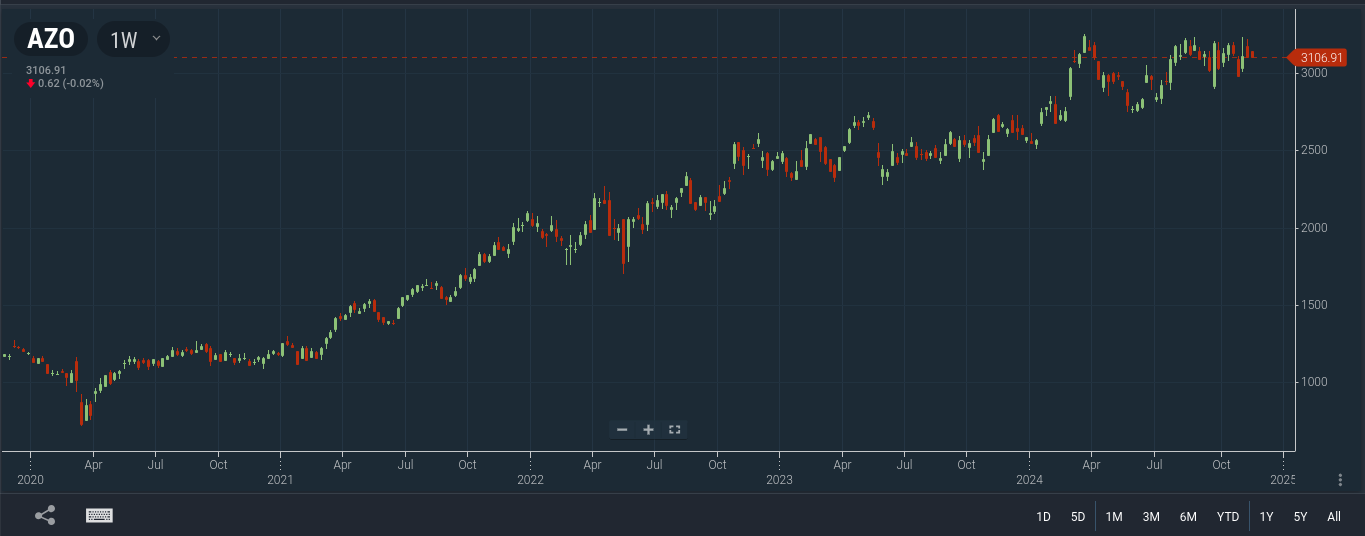
We selected AutoZone over O'Reilly Automotive due to a combination of valuation and analyst ratings. Some of the fundamental valuation factors compared include:
| Metric | AZO | ORLY |
| Price to Earnings (P/E) | 21.18 | 30.11 |
| Price to Sales (P/S) | 2.99 | 4.32 |
| PEG Ratio | 1.67 | 1.89 |
Based on most fundamental metrics, AutoZone is the cheaper stock to own, and analysts seem to agree. Based on reports from 25 different analysts, AZO shares are a consensus Buy, while ORLY is a consensus Hold. AZO’s three most recent price targets indicate more than 12% upside potential, while recent price targets on ORLY shares indicate only a 4% upside.
[OUR BLACK FRIDAY SALE: Copy Trades That Hit Big Gains – Save $1000]
e.l.f. Beauty Inc. ELF
Another company that has previously had success managing trade war battles is e.l.f. Beauty, which sells cosmetic products such as lipstick, eyeliner, foundation, and other skin care products. The company has a solid domestic and international footprint and has products in stores ranging from high-end shops like Ulta Beauty Inc. ULTA to drugstores like Rite-Aid.
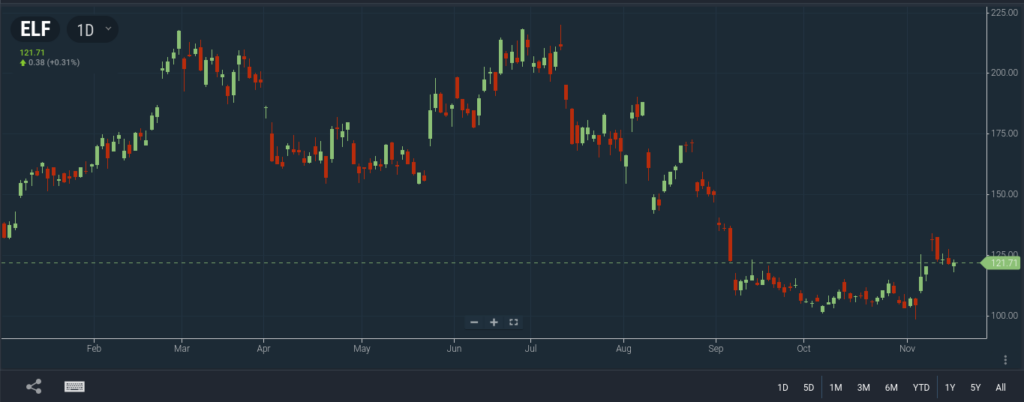
E.l.f. Beauty relies heavily on Chinese imports but remains on our list because CEO Tarang Amin is confident the company has both the pricing power and supply chain infrastructure to withstand any tariffs until 2026. The company informed customers back in August to expect prices to increase during a potential 2nd Trump term, which could increase sales in the short term as shoppers stock up on their favorite products before the administration can levy new tariffs.
J.B. Hunt Transport Services Inc. JBHT
One industry that seems set to benefit from tariffs with minimal downside is domestic shipping and trucking companies. As more retail and consumer discretionary firms move production back to the United States (or at least closer to shore), railways, trucking firms, and other companies focusing on intermodal and last-mile transportation could benefit greatly. One shipping stock that saw a boost in the immediate aftermath of Trump's election was JBHT.
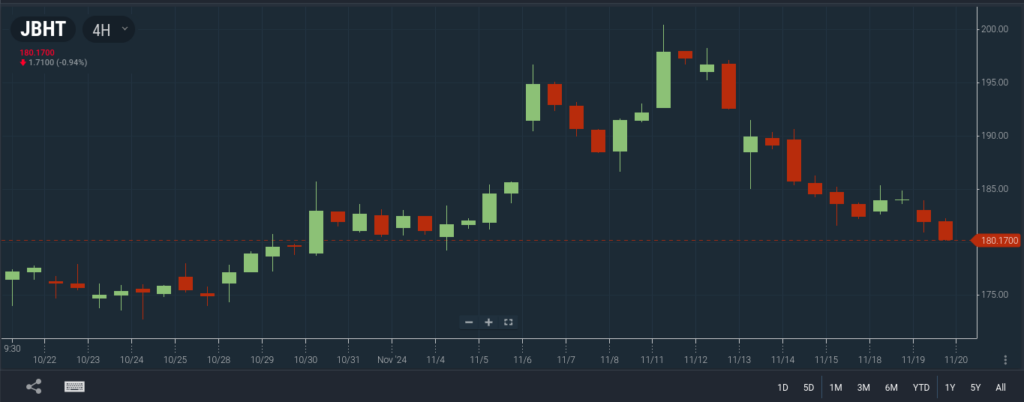
J.B. Hunt is one of the largest domestic transportation companies in the United States. One of its main businesses is loading and unloading shipping containers from railcars. If manufacturers re-shore or near-shore their operations closer to domestic shipping channels, stocks like JBHT could rapidly increase as revenue is boosted by expanding domestic rail usage.
Netflix Inc NFLX
If physical goods like electronics, cars, and clothes are going to get more expensive, an excellent place to invest will be services that trade in intellectual property. And after setting records for viewership and gate at the Jake Paul vs. Mike Tyson fight, Netflix is poised to steamroll into one of the few places it hasn't dared tread: live sports. On Christmas Day, Netflix will air two exclusive NFL games with significant playoff implications when the defending champion Kansas City Chiefs visit the Pittsburgh Steelers and the Baltimore Ravens take on the Houston Texans.
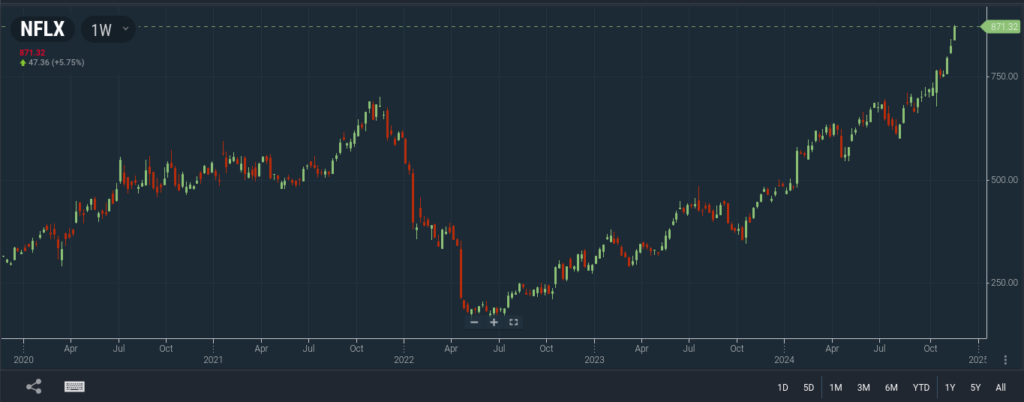
To borrow some terms from boxing, Netflix has knocked out its competition in the streaming wars. The company boasts more than 247 million subscribers in 2024, far outpacing Amazon's Prime Video's 200 million (and you don't get the benefits of Prime shipping with Netflix). Disney+ is growing rapidly but still sits nearly 100 million subs behind Netflix.
Hasbro Inc. HAS
Toy maker Hasbro has been a trendsetter when it comes to moving production out of China. The company began moving its operations away from the communist regime in 2012, citing "enterprise risk," the transition has drastically limited the company's exposure to tariffs, showcasing strategic foresight and a proactive approach.
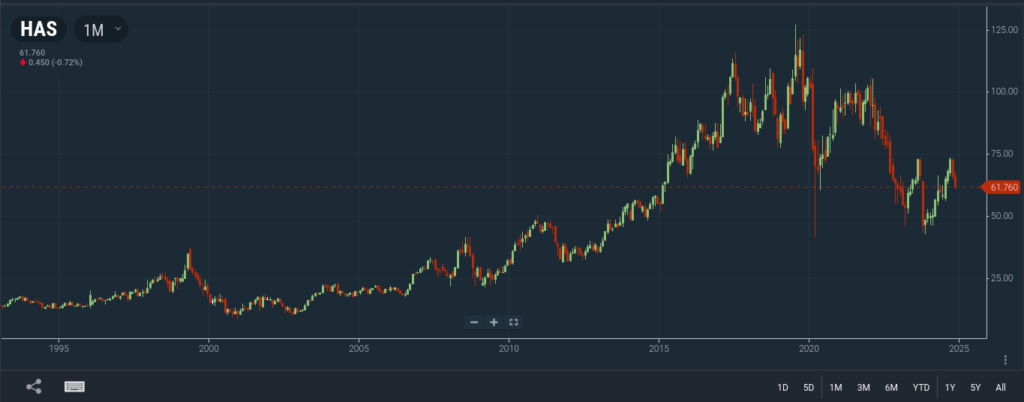
Hasbro makes popular toys, board games, and party favorites under brands like Parker Brothers, Milton Bradley, Kenner, and its own name. While most of its products had traditionally been made in China, the company began its exit in 2012 and reduced Chinese manufacturing to the United States to 50% as of 2020. While the company still depends significantly on Chinese imports, analysts believe the business is better insulated from tariff costs than its peers like Mattel. Plus, many toys were granted a reprieve from the initial tariff blast in 2017, and it’s possible that carveouts could be on deck for companies like Hasbro that moved production out of China.
Now you can trade alongside Matt Maley—the Wall Street veteran featured on CNBC, Bloomberg, and Yahoo Finance over 50 times. His trades in 2024 included 570% on TLT in 24 hours and 460% on GDX in a week.
This Black Friday, save $1000 and get the same guidance institutions pay $50,000/year for. Don't miss out – click to get started now.
Image via Shutterstock
Edge Rankings
Price Trend
© 2025 Benzinga.com. Benzinga does not provide investment advice. All rights reserved.
Trade confidently with insights and alerts from analyst ratings, free reports and breaking news that affects the stocks you care about.